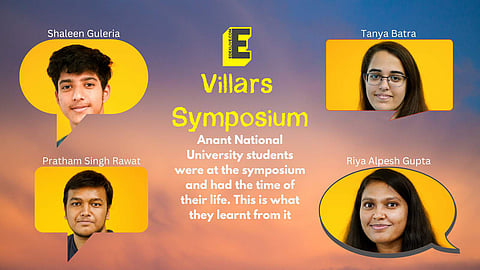

To attend Villars Symposium 2023 held at Villars-sun-Ollon, Switzerland is an opportunity not everyone gets. But four students from Anant National University — Tanya Batra, Riya Gupta, Shaleen Guleria and Pratham Singh Rawat — did bag the opportunity and they made the most of it.
The event itself is aimed at bringing students and sustainability experts on one platform to discuss global issues. And this is what the students learnt. Excerpts from our conversation:
How was your experience being a part of the Villars Symposium 2023?
Pratham Singh Rawat: Attending the Villars Symposium has been an enriching experience that has left an indelible mark on my intellectual and personal growth. The symposium brought together a diverse intergenerational community of Villars Fellows, scholars, experts, and thought leaders, creating an atmosphere conducive to profound discussions and transformative learning.
Tanya Batra: This experience definitely made my learning journey more valuable. It has taught me that there are several factors involved while making changes in the world. It is important to look at the problems or crises that our world is facing with different and optimistic views.
Riya Gupta: Being a part of the Villars Symposium this year was a wonderful journey, from learning about the Villars Institute to making new friends with the music performers. It's an amazing institute to be a part of if you want to learn and restore the health of the planet for all of its inhabitants. The Villars Institute is located in the Swiss Alps, and it is a centre for systemic change and a place for intergenerational collaboration. They also promote biodiversity, planetary health, and sustainable development.
Shaleen Guleria: It was something really important I was looking for, and getting to know about problems from different points of view and helping me understand the system components and elements really helped me a lot.
Were you part of any live projects or conferences held during your stay there?
Tanya Batra: Yes, we had different panel discussions on planetary boundaries, critical skills required for the future of the planet, net zero emissions, the power of nature's narrative, a nature-positive economy, the power adventure to protect the planet, and practising ecopreneurship.
Riya Gupta: I attended many conferences and workshops about planetary health, how our lifestyles affect the health of the planet and how the smallest thing like our dietary plan has a major effect on climate change and we got to learn about how to change scientific research into human emotions and many such things.
What impact does being an attendee at the Villars Symposium have on your intended career path?
Pratham Singh Rawat: The thought-provoking presentations on themes like net zero, future skills for the planet, and case studies on ecopreneurship and so on compelled me to critically evaluate my own assumptions. This introspection allowed me to identify areas of personal growth, enabling me to refine my perspectives and contribute more effectively to the broader discourse on societal progress on climate action.
Tanya Batra: It has made me understand that I want to attend to world crises with the skills that I have and make the utmost use of my engineering degree in climate change; use technology to collaborate with nature.
Can you name the most interesting thing that you've learnt?
Riya Gupta: The most interesting thing I have learnt is that Earth does not need saving from us. It has the capability to heal itself if we let it happen. But rather than doing this, we exploit it even more. With compassion, problems like climate change can be solved. Without having empathy we won't be able to put ourselves in the situation where the impacts are the most and we won't be able to think with different perspectives to find a solution. Climate change has different problems and different impacts so only finding one solution won't help.
Tanya Batra: I would like to quote Ibrahim Maigari, Founder and CEO, Rice Afrika, "If you stop learning, you start dying."
How was your interaction with the professors and the other students at the Villars Symposium?
Tanya Batra: It was a great experience. Everyone strived to collaborate in a way that broke the intergenerational gap as we all had the same motive. It was a whole collection of people who had the same mindset, which was "making the world a better place".
Shaleen Guleria: Interaction with the professors and the other students at the Villars Symposium was amazing. Everyone was very down-to-earth and very approachable. They were curious to learn about what we do as climate engineering students.
I have learnt that, “The darkest night produces the brightest stars so there's always light and nothing is hopeless.”
